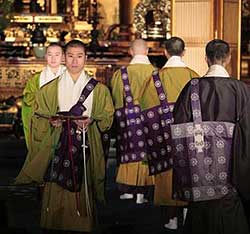Japan’s ‘monks by mail’ offer Buddhist ministry in Internet age
BY MARI YAMAGUCHI
AP
FEB 2, 2016
YACHIYO, CHIBA PREF. – In Japan, where communal ties to local Buddhist temples are fading, families have in recent years been able to go online to find a monk to perform funerals and other rites.
But when Amazon Japan allowed a provider to offer Obo-san bin, or Mr. Monk Delivery, on its website, it shone a spotlight on the emerging trend and prompted a major Buddhist organization to criticize the Internet marketer of commercializing religion.
A basic plan for a monk, transportation and a donation offered by the Tokyo-based provider, Minrevi Co., one of dozens of emerging budget companies, costs ¥35,000. Three other options are available for more money. The monks would typically go to a home, funeral hall or a grave to perform the requested ceremony.
“Such a thing is allowed in no other country in the world. In this regard, we must say we are disappointed by an attitude toward religion by Amazon,” Akisato Saito, director of the Japan Buddhist Association, said in a statement.
http://www.japantimes.co.jp/news/201...-internet-age/




 Reply With Quote
Reply With Quote

 Really.
Really.  the power of his cologne ...
the power of his cologne ... 












